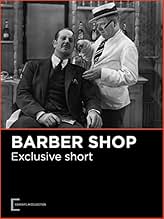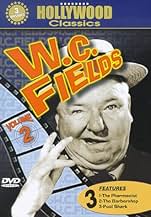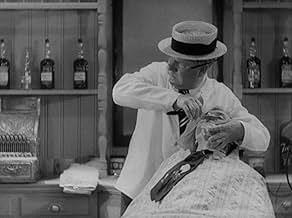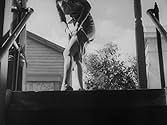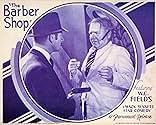Adicionar um enredo no seu idiomaAn inept barber maintains his good-humored optimism in his small town shop despite having a hen-pecking harridan for a wife and a total lack of tonsorial skill.An inept barber maintains his good-humored optimism in his small town shop despite having a hen-pecking harridan for a wife and a total lack of tonsorial skill.An inept barber maintains his good-humored optimism in his small town shop despite having a hen-pecking harridan for a wife and a total lack of tonsorial skill.
- Direção
- Roteirista
- Artistas
John Sinclair
- Mr. Flugg
- (as John St. Clair)
Frank Alexander
- Steam Room Victim - Before
- (não creditado)
Billy Bletcher
- Steam Room Victim - After
- (não creditado)
Joe Bordeaux
- Passerby
- (não creditado)
Harry Bowen
- Cop
- (não creditado)
Joe Calder
- Passerby
- (não creditado)
Julia Griffith
- Mrs. Scroggins - Passerby
- (não creditado)
Fay Holderness
- Little Girl's Mother
- (não creditado)
George Humbert
- Jose
- (não creditado)
William McCall
- Man with Horse
- (não creditado)
Gloria Velarde
- Gloria - Little Girl in Barber's Chair
- (não creditado)
Frank Yaconelli
- Italian Man Selling Bass Fiddle
- (não creditado)
Avaliações em destaque
The Barbershop was the fourth and last Mack Sennett short subject that W.C. Fields did for Paramount. In this last one and in The Pharmacist he honed his henpecked character to perfection.
As you gather by the title Fields is a barber and he lives above the shop with his wife Elsie Cavanna and son Harry Watson who is busy annoying dad with a lot of stupid riddles. It may have been in this film and in The Pharmacist that Fields developed his well known appetite for children. Remember he said he liked them if they were properly cooked.
His moment of sunshine every day is shapely manicurist Dagmar Oakland who brightens his working day. But Fields is so under the thumb of his wife he dare not make a move. Still he can and does dream.
My favorite gag is the very obese gentleman who went into the steam room Fields installed and came out like a third world starvation victim. If losing weight were only that simple.
I do also like that two bull fiddles mate and have a nice litter of violins as a result. That's another great sight gag.
In the end Fields does not get credit for an albeit accidental act of heroism. But it's all in a day for Fields whose characters just can't catch a break ever.
As you gather by the title Fields is a barber and he lives above the shop with his wife Elsie Cavanna and son Harry Watson who is busy annoying dad with a lot of stupid riddles. It may have been in this film and in The Pharmacist that Fields developed his well known appetite for children. Remember he said he liked them if they were properly cooked.
His moment of sunshine every day is shapely manicurist Dagmar Oakland who brightens his working day. But Fields is so under the thumb of his wife he dare not make a move. Still he can and does dream.
My favorite gag is the very obese gentleman who went into the steam room Fields installed and came out like a third world starvation victim. If losing weight were only that simple.
I do also like that two bull fiddles mate and have a nice litter of violins as a result. That's another great sight gag.
In the end Fields does not get credit for an albeit accidental act of heroism. But it's all in a day for Fields whose characters just can't catch a break ever.
With the great W.C. Fields in fine form, and a setup that provides him with a lot of good material, "The Barber Shop" is a very enjoyable short comedy. It is filled with the kinds of details and subtle gags that make Fields's comedies worth watching attentively.
"The Barber Shop" closely resembles the Fields feature "The Pharmacist", with very similar settings and stories. Both are very good, and in both of them Elise Cavanna is funny as the domineering wife of Fields's character. Both have some gags that are deliberately absurd, and others that are less obvious. Both feature amusing exchanges between Fields and numerous customers.
When Fields was at his best, he could really get across the wackiness of so much of what happens in daily life, and that's one of the things that works quite well here.
"The Barber Shop" closely resembles the Fields feature "The Pharmacist", with very similar settings and stories. Both are very good, and in both of them Elise Cavanna is funny as the domineering wife of Fields's character. Both have some gags that are deliberately absurd, and others that are less obvious. Both feature amusing exchanges between Fields and numerous customers.
When Fields was at his best, he could really get across the wackiness of so much of what happens in daily life, and that's one of the things that works quite well here.
THE BARBER SHOP (Paramount, 1933), directed by Arthur Ripley, marks the fourth and final Mack Sennett Star Comedy short to feature W.C. Fields (who also scripted), following THE DENTIST (1932), THE FATAL GLASS OF BEER (1933) and THE PHARMACIST (1933). Not quite as famous as the initial two, THE BARBER SHOP does bear a strong resemblance to THE PHARMACIST, that of Fields wearing a straw hat with an open top; his encounter with a bank robber; and having Elsie Cavanna (famous as the drill patient in THE DENTIST) in the role of his wife. As with THE DENTIST, however, the customers in THE BARBER SHOP are more victims than patrons. For Fields' final short (lasting 21 minutes), much of it falls into familiar territory in true Fields-comedic style, with touches of originality, especially his chosen character name, pun intended.
Set in Felton City, "Population 873, Elevation two feet below sea level," the story revolves around the day in the life of Cornelius O'Hare (W.C. Fields), a small town barber with a nagging wife (Elsie Cavanna) and a young son, Ronald (Harry Watson). O'Hare's morning starts off peacefully as he sits in front of his place of business (with his home in back of the barber shop), greeting the passing residents while sharpening his razor, then playing his huge bass fiddle he names "Lena." After dining at the breakfast table with his family, O'Hare's work day, shared by his manicurist (Dagmar Oakland), soon comes to a series of mishaps as he shaves off a mole from a man's chin, places an ultra hot towel over that same customer's (John St. Clair) face by holding a pair of tongs, and unwittingly locking a fat man ("Fatty" Alexander) in a steam room before O'Hare's day is complete as he finds himself face to face with an armed bank robber (Cyril Ring).
With Fields being best known playing one with a strong dislike for children and animals, THE BARBER SHOP shows his compassion towards his offspring, listening attentively listening to his riddles, rather than being short-tempered towards his annoyance. In fact, there's even a brief scene where he happily throws a ball over to the neighborhood street kids, only to have it landing on top of a man's noggin. So not to be a total loss, the plot does include Fields' encounter with a baby in a stroller hitting him over the head with a milk bottle, as well as his involvement with Mrs. Broadbottom's (Fay Holderness) bratty daughter, Gloria, wearing an assortment of party hats. A dog takes part sitting by the barber's chair awaiting for another chance for O'Hare to accidentally cut off an ear while shaving a customer, but all the dog can do is witness some "close shaves."
Although the brief climatic chase and its closing fail to recapture some rather amusing scenes earlier in the story, THE BARBER SHOP does recapture classic routines originated on stage by Fields himself, some for which he reprized to better advantage in his later feature film comedies. With Alison Skipworth and Kathleen Howard making the grade as Fields' most notable co-stars during his years (1932-38) at Paramount, Elsie Cavanna shouldn't go unnoticed with her participation in three of Fields four comedy shorts, with THE DENTIST as their most famous and revived.
THE BARBER SHOP, along with other Fields' shorts, has turned up occasionally on television over the years, notably cable stations (American Movie Classics in the 1990s, and Turner Classic Movies a decade later), and distribution on video and DVD formats, with best possible prints from the Criterion Collection. For some amusements, watch Cornelius O'Hare's barber shop methods. For a good haircut and a shave, try someplace else. (***)
Set in Felton City, "Population 873, Elevation two feet below sea level," the story revolves around the day in the life of Cornelius O'Hare (W.C. Fields), a small town barber with a nagging wife (Elsie Cavanna) and a young son, Ronald (Harry Watson). O'Hare's morning starts off peacefully as he sits in front of his place of business (with his home in back of the barber shop), greeting the passing residents while sharpening his razor, then playing his huge bass fiddle he names "Lena." After dining at the breakfast table with his family, O'Hare's work day, shared by his manicurist (Dagmar Oakland), soon comes to a series of mishaps as he shaves off a mole from a man's chin, places an ultra hot towel over that same customer's (John St. Clair) face by holding a pair of tongs, and unwittingly locking a fat man ("Fatty" Alexander) in a steam room before O'Hare's day is complete as he finds himself face to face with an armed bank robber (Cyril Ring).
With Fields being best known playing one with a strong dislike for children and animals, THE BARBER SHOP shows his compassion towards his offspring, listening attentively listening to his riddles, rather than being short-tempered towards his annoyance. In fact, there's even a brief scene where he happily throws a ball over to the neighborhood street kids, only to have it landing on top of a man's noggin. So not to be a total loss, the plot does include Fields' encounter with a baby in a stroller hitting him over the head with a milk bottle, as well as his involvement with Mrs. Broadbottom's (Fay Holderness) bratty daughter, Gloria, wearing an assortment of party hats. A dog takes part sitting by the barber's chair awaiting for another chance for O'Hare to accidentally cut off an ear while shaving a customer, but all the dog can do is witness some "close shaves."
Although the brief climatic chase and its closing fail to recapture some rather amusing scenes earlier in the story, THE BARBER SHOP does recapture classic routines originated on stage by Fields himself, some for which he reprized to better advantage in his later feature film comedies. With Alison Skipworth and Kathleen Howard making the grade as Fields' most notable co-stars during his years (1932-38) at Paramount, Elsie Cavanna shouldn't go unnoticed with her participation in three of Fields four comedy shorts, with THE DENTIST as their most famous and revived.
THE BARBER SHOP, along with other Fields' shorts, has turned up occasionally on television over the years, notably cable stations (American Movie Classics in the 1990s, and Turner Classic Movies a decade later), and distribution on video and DVD formats, with best possible prints from the Criterion Collection. For some amusements, watch Cornelius O'Hare's barber shop methods. For a good haircut and a shave, try someplace else. (***)
Personally, I like Fields' features much more than the few short films he made. The Bank Dick, You Can't Cheat an Honest Man, You're Telling Me, The Old-Fashioned Way, It's a Gift, Never Give a Sucker an Even Break, and The Man on the Flying Trapeze are some of the funniest films you're ever likely to see. But most of his shorts are somewhat lame. My favorite is The Golf Specialist, which is nothing more - nor should it be - than Fields' infamous vaudeville routine. The Dentist is famous for its sexual innuendo of the woman wrapping her legs around Fields while he pulls a tooth, but it's not very funny after that. The Barber Shop is the second funniest of these shorts. Fields is very funny in it, and so are the supporting cast members. Here Fields is in henpecked husband mode, taking it from his evil vegetarian wife. His little son likes to tell him the lamest riddles in history. The slight plot is a prelude to The Bank Dick, with a criminal on the run and Fields bragging that he'd throttle him good if he got a hold of him. A lot of good jokes here. See it on the Criterion disc of his short films. 8/10.
ONCE IN A LIFETIME, there is a short period of the most unusual, nearly unbelievable events occur. Call it coincidence or a Gift from God; but whatever there is no denying that something very extraordinary has happened. Such was the case at MACK SENNETT STUDIOS in 1932-33; when the four great W.C. Fields sound shorts were made.
TO THE DELIGHT of the Depression Era Moviegoers, the Sennett Fun Factiry had filmed and released what was destined to be a blueprint for what would be the W.C. Fields character and storyline for the rest of his career. Be it at the Movies or on Radio, whatever the character's name was, it was Fields.
OF THOSE PREVIOUSLY mentioned little masterpieces, our subject today, THE BARBER SHOP (Sennett/Paramount, 1933) was the last to reach the movie houses. Prior to this, we had been treated with THE DENTIST (19332), THE FATAL GLASS OF BEER (1933) and THE PHARMASIST ('33).
THESE FOUR SOUND Shorts combined out-produced many a feature length comedy, by far. That they would make an excellent presentation at a revival movie house goes without saying. A number of years ago, we were privileged in attending such a showing. It was a the Wilmette Theatre in suburban Chicago, that a marathon of 'Old Time Comedy Movies' was the playbill for the night. One segment played these four and the old laugh meter was nearly worn out.
AS FOR TODAY'S reviewed subject, THE BARBER SHOP, we can only say that it is that great W.C. Fields show; but with a little variation. He is once again a crusty, grumpy and largely misunderstood father. But this time he seems to have just a little more sympathetic treat from family; particularly from his one son, Ronald (Harry Watson). The son shares an affinity with his Pop for humorous riddles and recites many to please "the Old Man" at the supper table.
AS IS THE case with all of the 3 other Sennett two reelers, Mr. Fields insured his characterization by being the writer of the original stories. (This is clearly evident with the Barber's name, Corneilus O'Hare.) Sennett veteran Gag Man and Director, Arthur Ripley, directed and , many of the old Keystone players are seen in supporting roles.
TO THE DELIGHT of the Depression Era Moviegoers, the Sennett Fun Factiry had filmed and released what was destined to be a blueprint for what would be the W.C. Fields character and storyline for the rest of his career. Be it at the Movies or on Radio, whatever the character's name was, it was Fields.
OF THOSE PREVIOUSLY mentioned little masterpieces, our subject today, THE BARBER SHOP (Sennett/Paramount, 1933) was the last to reach the movie houses. Prior to this, we had been treated with THE DENTIST (19332), THE FATAL GLASS OF BEER (1933) and THE PHARMASIST ('33).
THESE FOUR SOUND Shorts combined out-produced many a feature length comedy, by far. That they would make an excellent presentation at a revival movie house goes without saying. A number of years ago, we were privileged in attending such a showing. It was a the Wilmette Theatre in suburban Chicago, that a marathon of 'Old Time Comedy Movies' was the playbill for the night. One segment played these four and the old laugh meter was nearly worn out.
AS FOR TODAY'S reviewed subject, THE BARBER SHOP, we can only say that it is that great W.C. Fields show; but with a little variation. He is once again a crusty, grumpy and largely misunderstood father. But this time he seems to have just a little more sympathetic treat from family; particularly from his one son, Ronald (Harry Watson). The son shares an affinity with his Pop for humorous riddles and recites many to please "the Old Man" at the supper table.
AS IS THE case with all of the 3 other Sennett two reelers, Mr. Fields insured his characterization by being the writer of the original stories. (This is clearly evident with the Barber's name, Corneilus O'Hare.) Sennett veteran Gag Man and Director, Arthur Ripley, directed and , many of the old Keystone players are seen in supporting roles.
Você sabia?
- CuriosidadesThis film is included on "W.C. Fields - Six Short Films", which is part of the Criterion Collection, spine #79.
- Citações
Cornelius O'Hare: I'm the worst barber in town, my wife can tell you that.
- ConexõesEdited into W.C. Fields: 6 Short Films (2000)
Principais escolhas
Faça login para avaliar e ver a lista de recomendações personalizadas
Detalhes
- Tempo de duração21 minutos
- Cor
- Mixagem de som
- Proporção
- 1.37 : 1
Contribua para esta página
Sugerir uma alteração ou adicionar conteúdo ausente

Principal brecha
By what name was O Barbeiro (1933) officially released in Canada in English?
Responda
